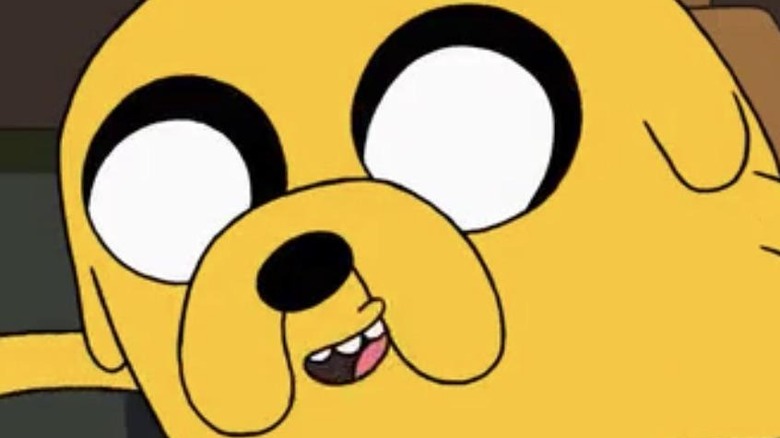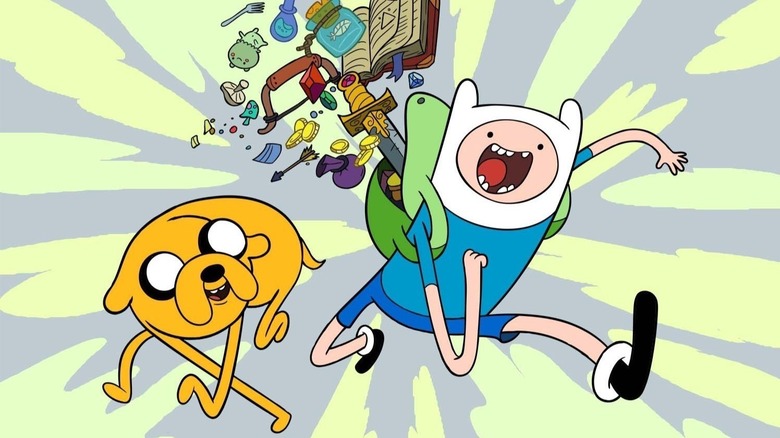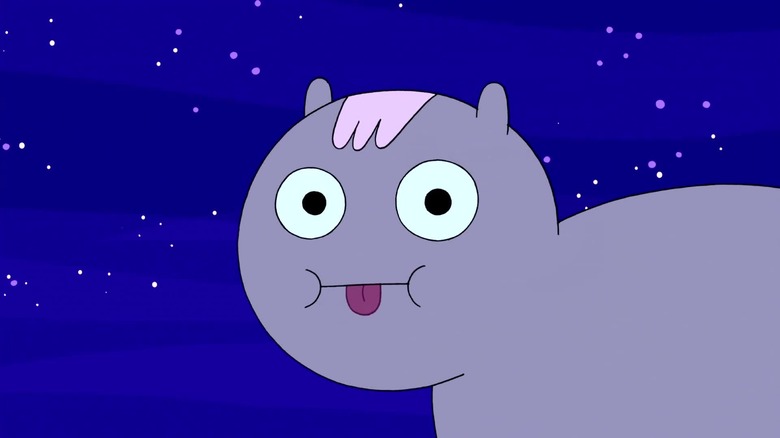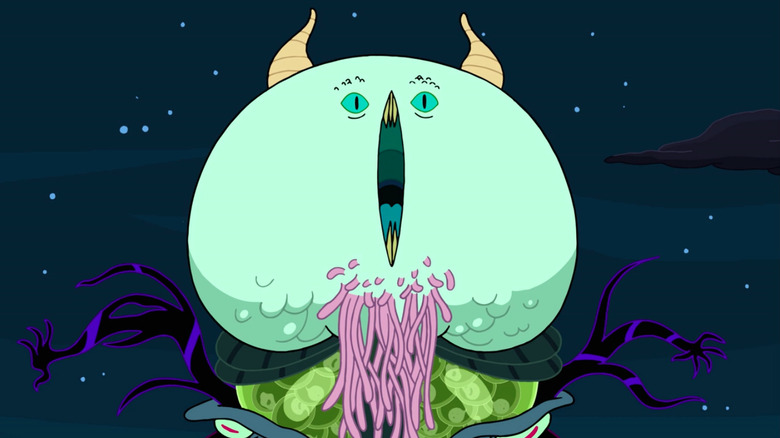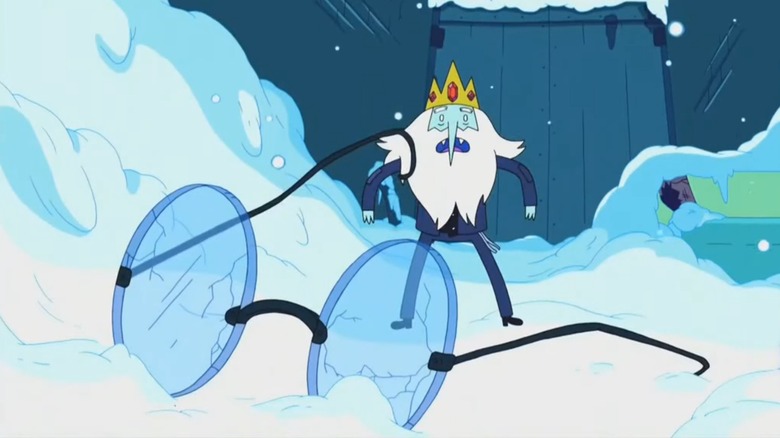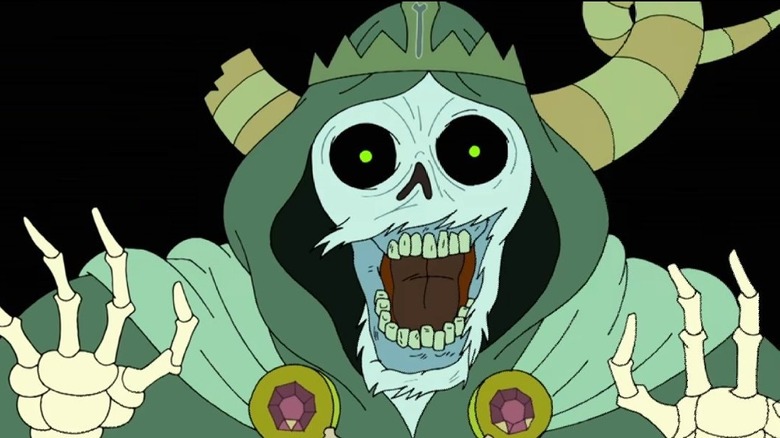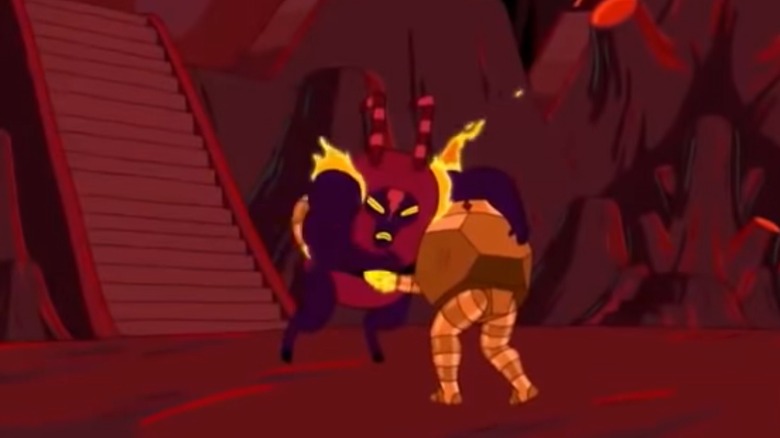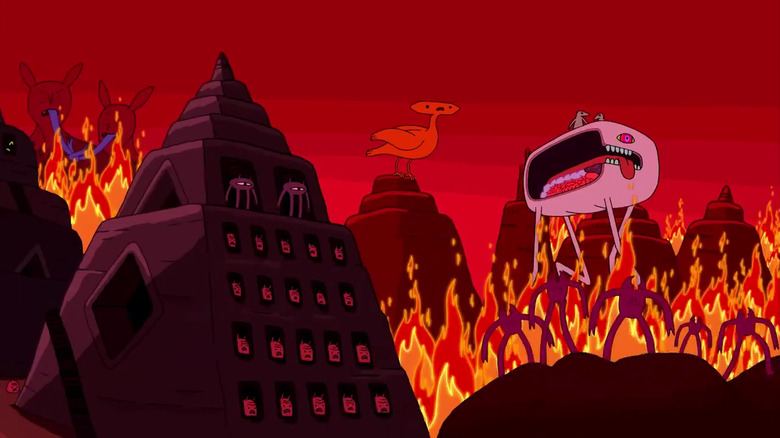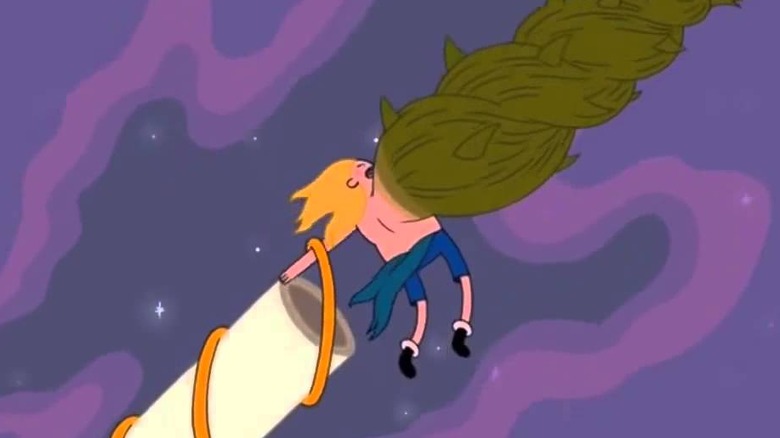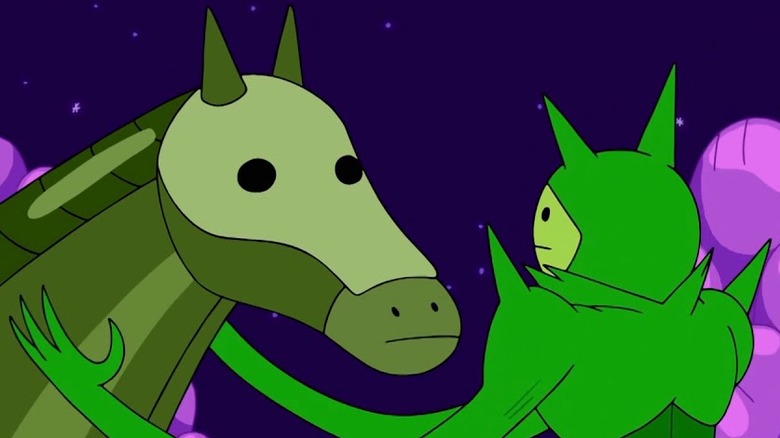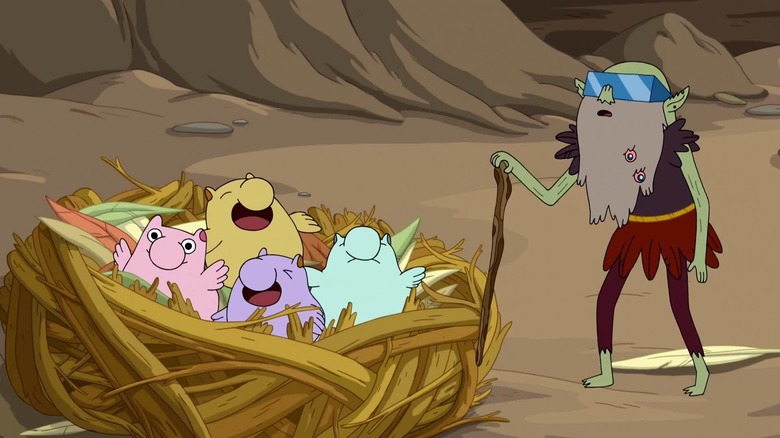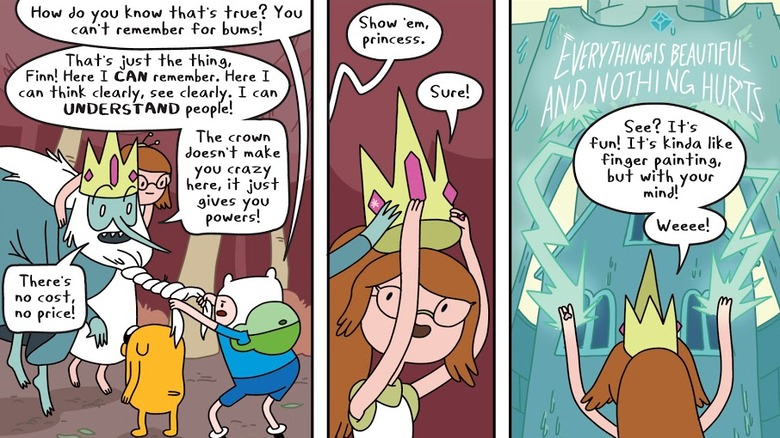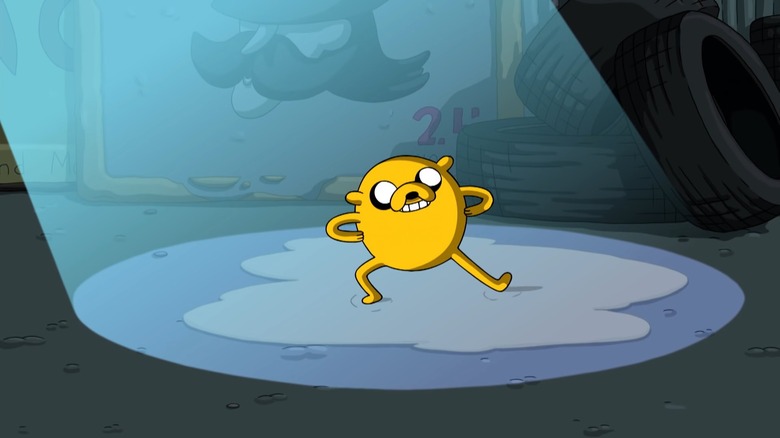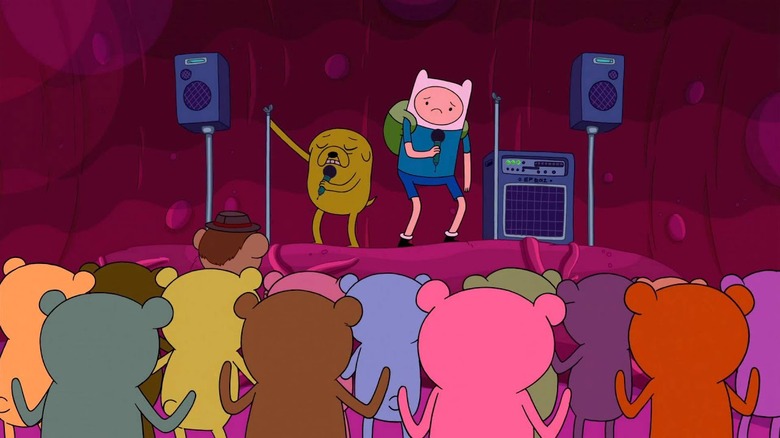Things Only Adults Notice In Adventure Time
It starts off with a simple premise like a million children's stories: Finn and Jake, a boy and his dog, go on exciting adventures in a fantastical world. We've seen plenty of other shows with these elements, but none have combined them with so many other concepts as "Adventure Time" — from anime and tabletop games to cosmic horror, internet meme culture, and anything else creator Pendleton Ward and company find interesting. And somehow, they've held it all together for over a decade and gained themselves legions of fans who've all managed to get on the show's weird wavelength ... or at least part of it.
However, there's some ambiguity about just what age those fans are supposed to be. "Adventure Time" is nominally a children's show, and it's got plenty of exciting adventures and silly jokes for that section of the audience. But plenty of references are going to sail over most kids' heads ... and even a good chunk of the adult audience's. And the show's creators seem to have spent half their time laughing at every idea of what is and isn't appropriate for children, whether it's dark themes, sexual content, or abject horror. So come along with us (and the butterflies and bees) as we break down things only adults notice in "Adventure Time."
Finn's catchphrases are radical 'radical' puns
So many cartoons feature desperate attempts to keep up with the youth audience, filling characters' mouths with instantly dated slang (assuming it was ever up to date or even used correctly to begin with). "Adventure Time" avoids all that by deliberately using the most outdated slang possible — and that's when they don't just make up their own. Longtime viewers have probably absorbed some of the show's unique vocabulary into everyday use, with phrases like "lumping," "oh my glob," and "what the junk?" And, of course, there are Finn favorites: "mathematical," "algebraic," "rhombus," and so on. But why does he use those particular phrases?
Well, a look back at all that outdated slang should give us the answer. Anyone who grew up in the '80s or '90s — or just on media produced back then — should be familiar with the word "radical." That can mean a lot of things, but besides meaning "cool" or "revolutionary," it can also be a mathematical term for expressions relating to a number's root (as in, another number that produces that first number when multiplied by itself). A thousand years and a Mushroom War later, "radical" could easily have mutated into "mathematical." That such a layered inside joke is such a major part of "Adventure Time" should give you some idea what we're dealing with here.
The Eyes is an homage to a cult favorite webcomic
In "The Eyes," Finn and Jake are just trying to get a good night's sleep after several days of nonstop adventuring. But they're interrupted by a creepy pony staring at them through the window, and that leads to a classic series of cartoon gags as they try to get it to leave them alone. It's even funnier because of the pudgy pony's doofy design, and it's proof the "Adventure Time" crew borrows from only the best.
Kate Beaton's "Hark, a Vagrant!" has become one of the biggest comics on the internet, with its combination of historical comedy and memorable turns of phrase like "aww yiss!" and "I had fun once, and it was awful." One strip introduced a goofy-looking, melon-shaped Shetland pony turned into an incongruous action hero. It was a hit, and the pony returned, becoming even more goofy-looking and melon-shaped every time, eventually looking an awful lot like the one in "Adventure Time." Beaton's enjoyed her character's newfound success — she's even spun the small horse off into a children's picture book, "The Princess and the Pony."
Marceline's dad is a Freudian nightmare
Marceline the Vampire Queen's had more than her share of daddy issues as the daughter of Hunson Abadeer, the demonic ruler of the hellish Nightosphere. Despite all this, Finn thinks it'd be a good idea to get Marceline and her dad together to talk it out. So he opens a portal to the Nightosphere to summon Hunson, who almost immediately escapes to steal the souls of Ooo.
When he consumes enough of them, he grows into a towering, and very suggestive, monster. His face opens up to reveal a huge, lumpy head that looks a lot like a pair of testicles, with a diamond-shaped, vaginal mouth. Underneath are all his stolen souls, looking an awful lot like sperm in egg-shaped pods. It wouldn't be the first time "Adventure Time" snuck in some suggestive character designs. Just look at rookie wizard Abracadaniel — with his skinny body, puffy pantlegs, and bell-shaped hair, his silhouette looks an awful lot like a certain part of the male anatomy.
Simon survives the apocalypse with the power of Cheers
In "Simon and Marcy," we flash back a thousand years to the immediate aftermath of the "Mushroom War" that turned Earth into the Land of Ooo. Young Marceline and Simon Petrikov, not yet fully transformed into the Ice King, are struggling to survive in the post-apocalyptic wasteland. Simon knows the crown is gradually destroying his mind, but he still uses it to protect Marceline over her objections. And even though TV has gone the way of the dinosaur, Simon still finds ways to entertain Marcy, popping out of the hollowed-out remains of a television set to sing a melancholy little tune. Later, an army of mutants attacks them, forcing Simon to put the crown back on. But the same song allows him to keep his grip on his personality as he belts it out while blasting the mutants away.
Kids may be baffled by the reference, but adults of a certain age should recognize it immediately. It's the theme song from "Cheers," one the biggest shows on TV from 1982 to 1993. It starred Ted Danson, who younger viewers should recognize from "The Good Place," as bartender Sam Malone, alongside the colorful collection of regulars at the titular bar. They included a young Woody Harrelson as Woody Boyd, Pixar regular John Ratzenbegrer as Cliff, and Kelsey Grammer as Frasier Crane, whose spinoff may have been even more popular.
Adventure Time has a whole galaxy of guest stars
Along with its regular cast of veteran voice actors like Tom Kenny and Hynden Walch, "Adventure Time" has made room for an abundance of one-off guest stars. To most kids, they'll just be interchangeable voices, but adults should find many of them familiar.
Weird Al appears as Banana Man, and "Brooklyn Nine-Nine" star and "Lonely Island" frontman Andy Samberg shows up as both Party Bear and Rap Bear. Lena Dunham appears at the height of her "Girls" fame as the first voice of Ice King's lost love, Betty Grof. There are plenty more cult-favorite comedians on the show, including Kumail Nanjiani, Paul F. Tompkins, Amy Sedaris, Bobcat Goldthwait, Jenny Slate, Paul Scheer, and Andy Daly. Plus, there are quite a few veteran character actors like Fred Melamed, Wallace Shawn, M. Emmet Walsh, and Ron Perlman, who plays Finn's nemesis, the Lich.
The crew also pays tribute to the stars of the shows they grew up on, like Lucy Lawless of "Xena: Warrior Princess" and Lou Ferrigno of "The Incredible Hulk." They seem to be especially big fans of "Star Trek" since they've pulled in George Takei, LeVar Burton, and Jonathan Frakes. But the gender-swapped "Fionna and Cake" episodes are where the casting really goes crazy, including Neil Patrick Harris as Prince Gumball, Donald Glover as Marshall Lee, and Hannibal Buress as Flame Prince. Strangest of all, punk rocker Henry Rollins appears as Lady Rainicorn's very un-punkish dad.
They Live fans got to see a Piper-David rematch
One bit of casting seems to have all been a lead-up to one elaborate inside joke. In "The Red Throne," professional wrestler "Rowdy" Roddy Piper appears as Don John, the Flame Lord. He tries to depose Flame Princess by freeing her father, voiced by Keith David, a veteran of voice roles like Goliath in "Gargoyles" and Dr. Facilier in "The Princess and the Frog" and memorable supporting parts in live-action movies like "Requiem for a Dream" and "The Thing."
One of those live-action roles pit David against Piper in "They Live." In this John Carpenter classic, Piper plays a drifter who discovers Earth's institutions are under the control of aliens that he can only see through special glasses. He tries to prove the truth to David, who's naturally a little skeptical. When Piper tries to get David to put on the glasses, David refuses, leading to the "Return of the King" of fight scenes. Every time you think it's over, it just keeps going.
If "Adventure Time" can't quite recreate the whole thing in its limited runtime, the creators get as close as they can in an epic fistfight between the Flame King and Flame Lord when Don John finds the king can't keep his promise of his daughter's hand in marriage.
Finn and Jake's memory loss makes sense if you know your anatomy
"Return to the Nightosphere" begins in the middle, with Finn and Jake in a pile of bananas in the titular dimension. They're just as confused as you are, and they spend most of the episode trying to figure out how they got there. In the next episode, "Daddy's Little Monster," they've finally made it home, and they find some answers in the videos on Jake's phone. Marceline invited them to visit her in the Nightosphere before her dad turned her into its new ruler.
That still doesn't explain the memory loss though, at least not for the kids. But there's one offhand detail to clue grown-ups in. When facing a demonic form of Marceline, Jake gets bashed over the head and shouts, "Ow! My hippocampus!" An adult with a working knowledge of anatomy should be able to figure out what he's talking about — the memory center of the brain. As for how they wake up in a pile of fruit, due to prison overcrowding down in the Nightosphere, they're tossed into a jail cell full of bananas. See? It all makes perfect sense.
Escape from the Citadel recreates a disturbing scene from Akira
In "Blade of Grass," Finn replaces his broken sword with a new one made of grass, despite the warning that it's cursed. And that curse comes for Finn after he learns his real father is in the Crystal Citadel, a prison for "cosmic criminals."
But in "Escape from the Citadel," they accidentally let in the Lich, who destroys the prison. And it turns out Finn's dad, Martin, couldn't be less interested in reconnecting with his son. He takes advantage of the chaos to escape without Finn when one section of the prison breaks free, connected to the rest by just a thin stem until one of the other inmates cuts it in two. Finn tries to keep Martin from leaving, and the Grass Sword turns into a giant arm that pulsates and swells disgustingly until it finally breaks, taking Finn's arm with it.
Decades earlier, Katsuhiro Otomo adapted his own comic, "Akira," into an anime classic. In the futuristic Neo-Tokyo, biker gangster Tetsuo discovers he was part of a secret experiment to turn children into super soldiers. The experiments manifest in an especially disgusting way in the last act when Tetsuo regrows an arm in a horrifying scene that the "Adventure Time" animators paid faithful tribute to. Fortunately, they didn't go quite as far as Otomo since we never saw Finn's whole body swell into a building-sized mass of oozing, puking flesh.
The Green Knight comes from a centuries-old poem
In "I Am a Sword," the Bandit Princess steals the Finn Sword — a blade made from an alternate-timeline version of Finn in circumstances we don't have near enough time to explain — and during their battle, Finn accidentally pierces it with the Grass Sword. This eventually merges the two weapons into Fern the Human, a Finn clone made of grass. In "Seventeen," he reappears as the Green Knight, who crashes Finn's birthday and offers him an axe ... but only if Finn "strikes" him with it. Finn knocks his head off, but the Knight puts it right back on.
It's a strange story, but it's also very, very old. "Sir Gawain and the Green Knight," written by an anonymous English poet in the 14th century, also opens at a party, this time at King Arthur's court in Camelot. The original Green Knight also disrupts the party to demand a challenge, but instead of following up with an arm-wrestling match and greased-pole climbing contest, Sir Gawain has to let the Green Knight return the favor a year later. If you want to know the rest of the story but don't like reading, we've got good news — there's a Dev Patel movie that tells the exact same story.
Adventure Time is full of mythological references
Like all fantasy fiction, "Adventure Time" draws heavily on ancient mythology. The standard mythical beasts are all there — cyclopes, minotaurs, manticores, and so on. But there are also subtler references to Greek myths. When Finn and Jake meet the Dream Warrior in Season 4, he gives them two golden apples. That's not much help in their current predicament, but it was helpful to the Greek hero Melanion, who used them to outrace Atalanta, winning her hand in marriage.
Plus, Huntress Wizard is the "Adventure Time" version of Artemis, the Greek goddess of the hunt. Like the goddess, Huntress Wizard avoids relationships to focus on her work, and she rides a deer. And "Flute Spell" reverses one famous myth when Huntress Wizard walks in on Finn bathing, but fortunately, no one gets turned into a deer and killed by their own dogs..
In "The Great Bird Man," Xergiok the Goblin King has lost his eyes and become a hermit in penance for his past sins. The same thing happened to the Greek king Oedipus in Sophocles' plays "Oedipus Rex" and "Oedipus at Colonus." But unlike Xergiok, Oedipus didn't get to just pop his eyes back in.
"Adventure Time" keeps playing with the myths right up to the end. In "Distant Lands: Together Again," Finn tries to find Jake in the Deadworlds and learns he's ascended to the "elite-est fields" — a pun on the Elysian Fields, the heaven of Greek mythology.
The Adventure Time comics drop in a Vonnegut reference
One medium wasn't enough to hold "Adventure Time," and BOOM! Studios tapped "Dinosaur Comics" creator and future "Squirrel Girl" writer Ryan North to bring Finn and Jake to the world of comics. The result was every bit as good as the show, if not better.
And as the TV series got darker and more invested in its characters' emotional lives, North kept right up with it. In "Adventure Time Comics" #18, the Lich traps Finn, Jake, and the Ice King in their own fantasies, finally reuniting Ice King and Betty. In #19, Betty uses Ice King's crown to create a palace with a motto over the gate that reads, "Everything is beautiful and nothing hurts."
That comes from Kurt Vonnegut's classic antiwar sci-fi novel "Slaughterhouse Five," the story of Billy Pilgrim, a World War II veteran who comes "unstuck in time." In the book, Vonnegut suggests "everything was beautiful and nothing hurt" as the perfect epitaph to carve on a gravestone. Such a heady literary reference may not mean much to kids, but it obviously meant a lot to North, since he'd go on to adapt Vonnegut's novel to comics in 2020.
Jake's birth is a parody of a parody
In "The Witch's Garden," Jake remembers getting his shapeshifting powers from a magic puddle, but viewers would have to wait years for the real answer.
"Joshua and Margaret Investigations" shows the adventures of Jake's parents' as paranormal detectives during Martha's pregnancy. We might imagine she's expecting Jake, but that turns out to be a red herring. Jake's real mother is a shape-shifting blue creature that bites Joshua on the head. That bite swells before finally exploding into baby Jake, who does a little song and dance before falling asleep.
Adults should recognize Jake's cinematic heritage from the chestburster in "Alien." But his singing, dancing entrance comes from a totally different movie. In Mel Brooks' sci-fi parody "Spaceballs," "Alien" star John Hurt cameos in a greasy spoon diner. It looks like he's about to be sick, but instead, a little alien bursts out of his chest, puts on a straw boater, and dances away to a clip of "Hello, My Baby!" from the "Looney Tunes" classic "One Froggy Evening."
The writers use every possible euphemism for sex
TV writers, especially if they're writing for kids, are in a constant battle with the network over what's fit to broadcast. If they're feeling brave, writers can outright antagonize their bosses, and few were more antagonistic than the folks at "Adventure Time." As it's a children's show, the writers couldn't just talk about sex, but they found every possible way to talk about it without actually using the word. For example, in "The Duke," the Duchess of Nuts talks about how her husband loves to "lie with" her, and Finn and Jake repeat the phrase so often it loses all meaning. And in "Furniture and Meat," Jake literally sits on Wildberry Princess' face — in a little chair.
In "The Belly of the Beast," Finn and Jake have to convince a bunch of happy bears to get out of a monster's stomach before they're digested alive. And they do this by singing a little song that goes, "All of our favorite foods are totally dead. / They cannot procreate in little food beds." This one obviously didn't get completely past the censors since the writers apparently had to balance out the "naughty words" quotient by never referring to poop as anything but "the stuff" throughout the episode.
